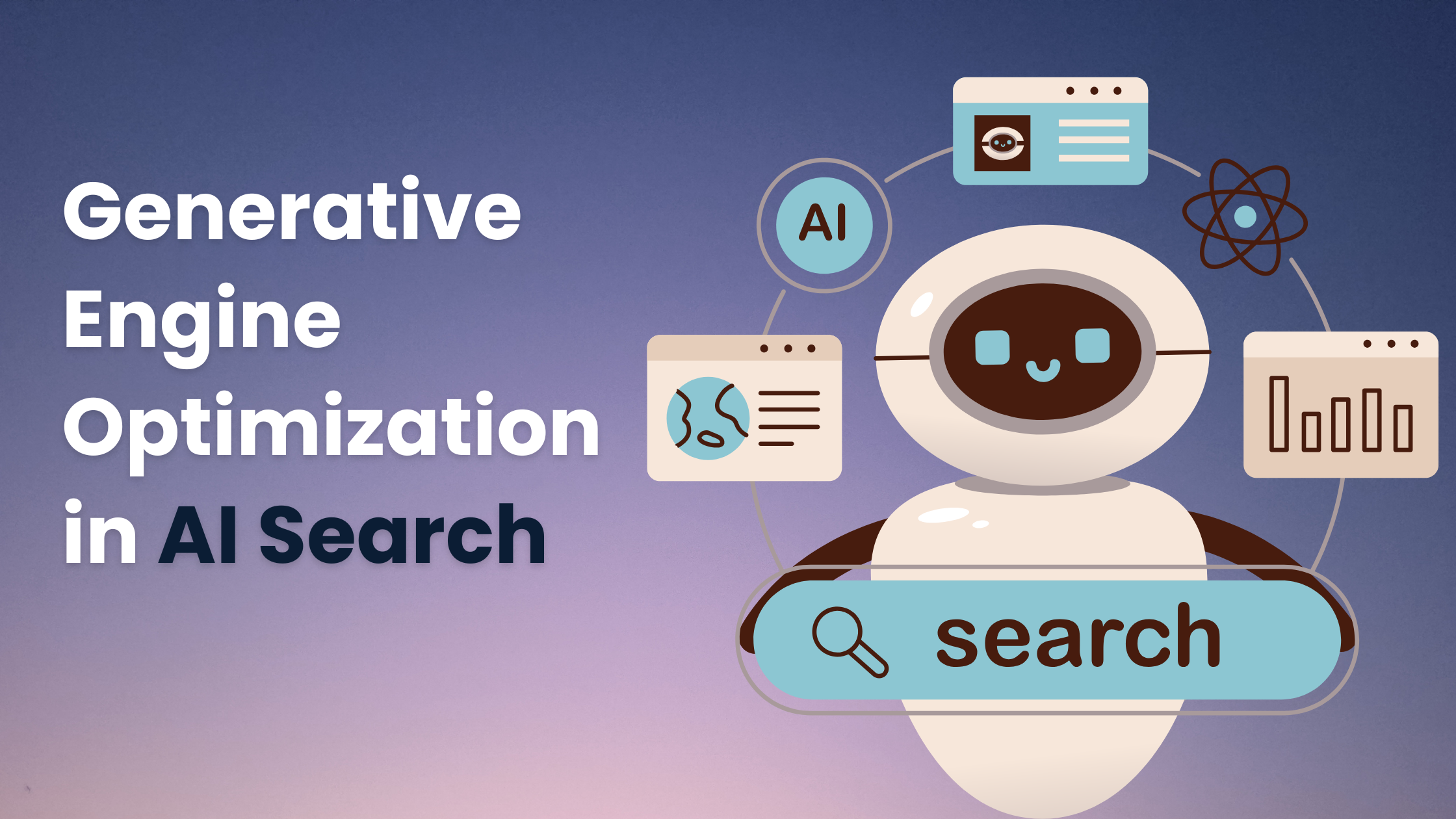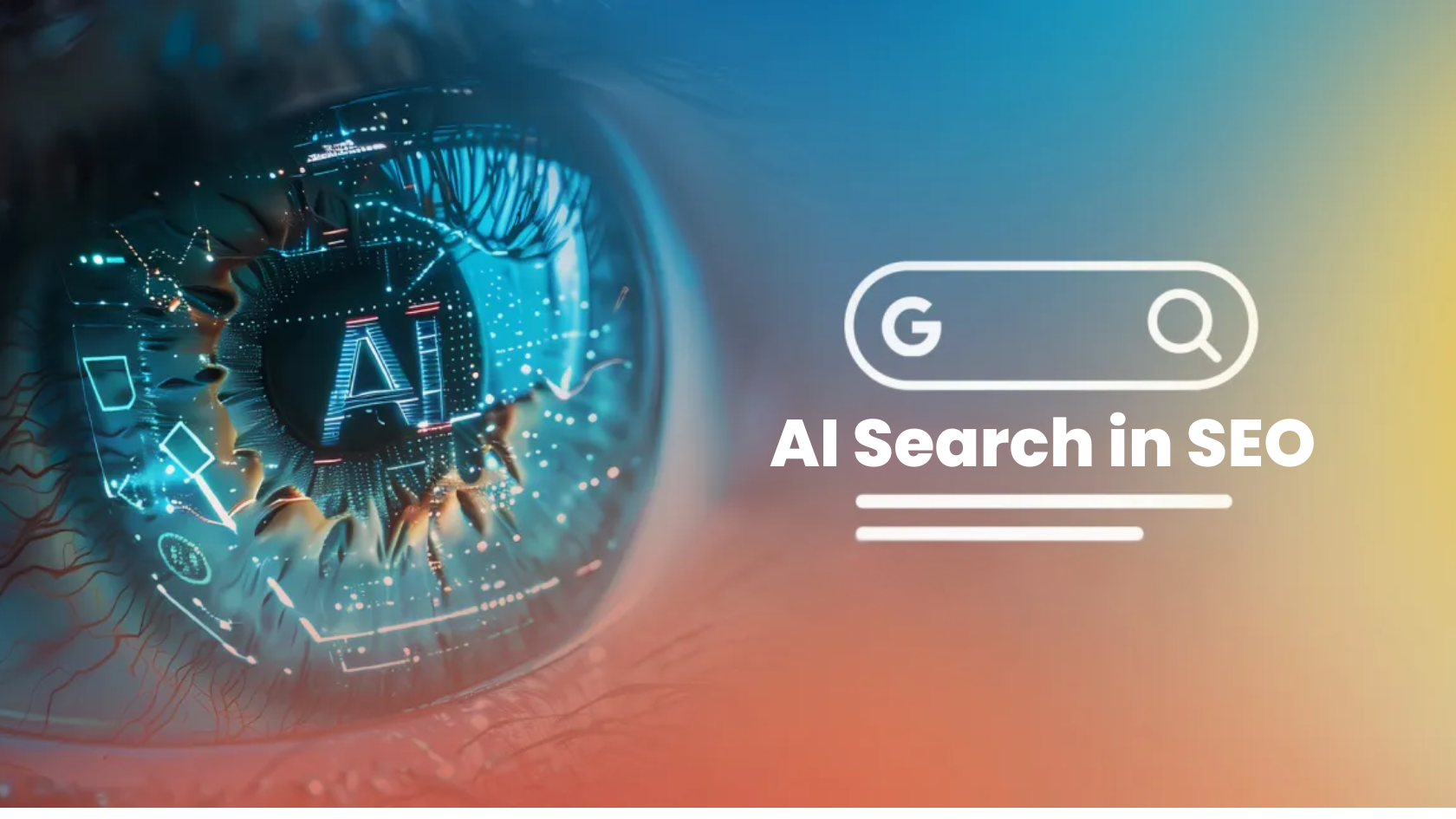AI is fundamentally reshaping how people search for information. According to Gartner, traditional search volume is expected to decline by 25% by 2026, as users increasingly rely on AI-generated responses instead of conventional search results. To maintain visibility in this evolving landscape, businesses must adopt Generative Engine Optimization (GEO)—a strategy designed to enhance content presence in AI-driven search ecosystems.
This blog discusses how GEO operates, its most significant advantages, and the strategic adaptations required to remain competitive.
What is GEO?
Generative Engine Optimization (GEO) is a new-age SEO strategy focused on optimizing content for AI-driven search platforms like ChatGPT and Google’s Search Generative Experience (SGE). Unlike traditional SEO, which aims for high rankings in search results, GEO strategy ensures that AI systems recognize, prioritize, and use content effectively in their generated responses.
How GEO Works?
The GEO process unfolds through several essential phases:
Data Alignment for Collection: Ensure content is sourced from accurate and relevant data to enhance AI system understanding.
Content Organization: Organize content using clear headings, subheadings, and metadata to improve AI accessibility.
Optimized for AI: Writing aligns with AI recognition patterns, using relevant keywords for better visibility.
Query-Focused: Content anticipates user questions, ensuring direct and meaningful answers.
Context-Rich: Goes beyond facts, adding depth for more relevant AI responses.
Continuous Improvement: Regularly refined for accuracy, quality and performance.
Current & Relevant: Updated to match trends and user needs for strong AI-driven SEO.
GEO vs. Traditional SEO: A Paradigm Shift
The transition from conventional SEO to Generative Engine Optimization mirrors the changing dynamics of digital search, where AI-driven systems redefine the way content is uncovered and delivered.
Traditional SEO centers on achieving prominent rankings within search engine results, whereas GEO strategy focuses on embedding content seamlessly into responses crafted by artificial intelligence.
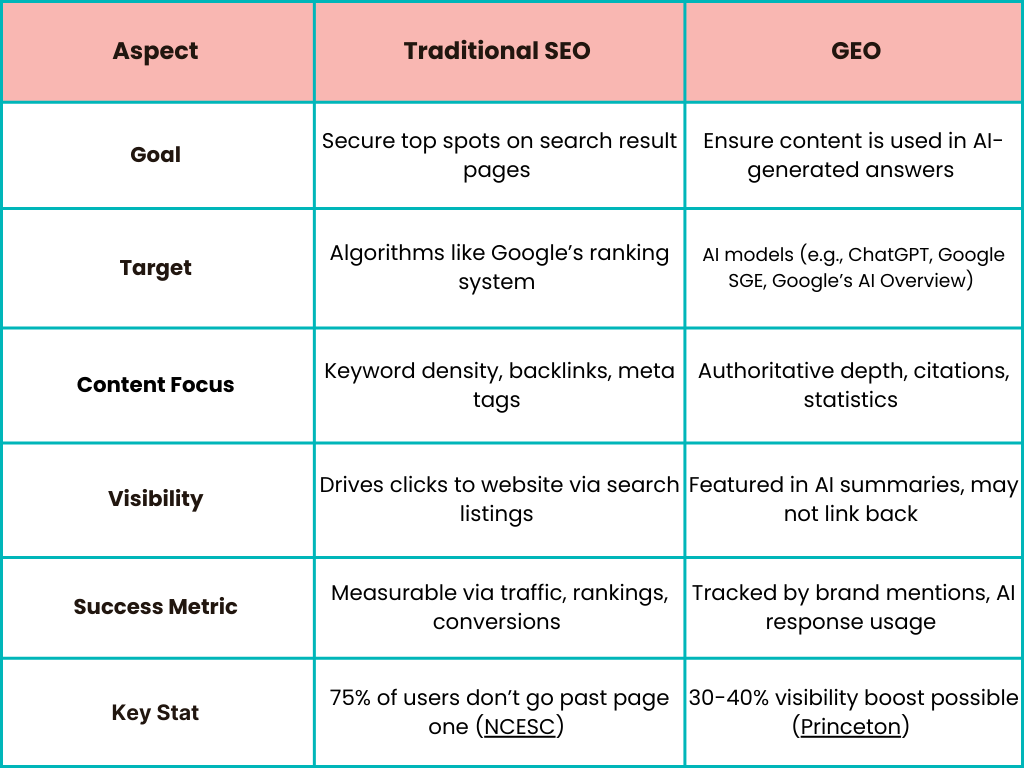
With AI-powered search gaining ground, embracing GEO principleswill prove vital for sustaining visibility and pertinence. This evolution points towards the need to employ SEO services that include GEO tactics so that businesses stay visible in AI-predicated search environments.
Why GEO Matters: Benefits for Your Business?
Expanded Reach: GEO ensures your content appears in AI-generated responses, connecting you with a broader audience effectively.
Enhanced User Experience: It delivers clear, relevant answers to user queries, improving satisfaction and engagement.
Competitive Edge: Adopting GEO strategy positions your business ahead of competitors, especially as 71 percent of organizations now use generative AI in at least one function, up from 65 percent in early 2024, with individual adoption also rising (McKinsey).
Brand Authority Boost: It reinforces your brand as a credible, leading voice in an AI-driven digital environment.
Businesses that optimize for GEO will dominate AI-driven search landscapes—don’t get left behind!
Data-Backed Strategies for Dominating AI-Driven SEO Search
Research suggests several content marketing strategies for effective GEO, informed by a study from Princeton, Georgia Tech, The Allen Institute of AI, and IIT Delhi (Study on Generative Engine Optimization):
Create Authoritative Content: Establish trust with in-depth, expert-driven material.
Use Citations: Reference credible sources to boost factual accuracy and visibility.
Add Statistics: Include data to enhance relevance, especially for opinion-based queries.
Incorporate Quotes: Leverage expert or historical quotations for richer context.
Simplify Language: Ensure clarity and accessibility for AI summarization.
Structure for AI: Organize content logically to aid generative engine processing.
Avoid Keyword Stuffing: Skip outdated SEO tricks that harm GEO performance.
By implementing these research-backed strategies, businesses can strengthen their visibility in AI-generated results. This ensures that their content remains authoritative, relevant, and optimized for the future of digital search.
Note: GEO is not an SEO replacement—it’s an evolution. Businesses must integrate both for sustained digital success.
Strategy Impact Table:
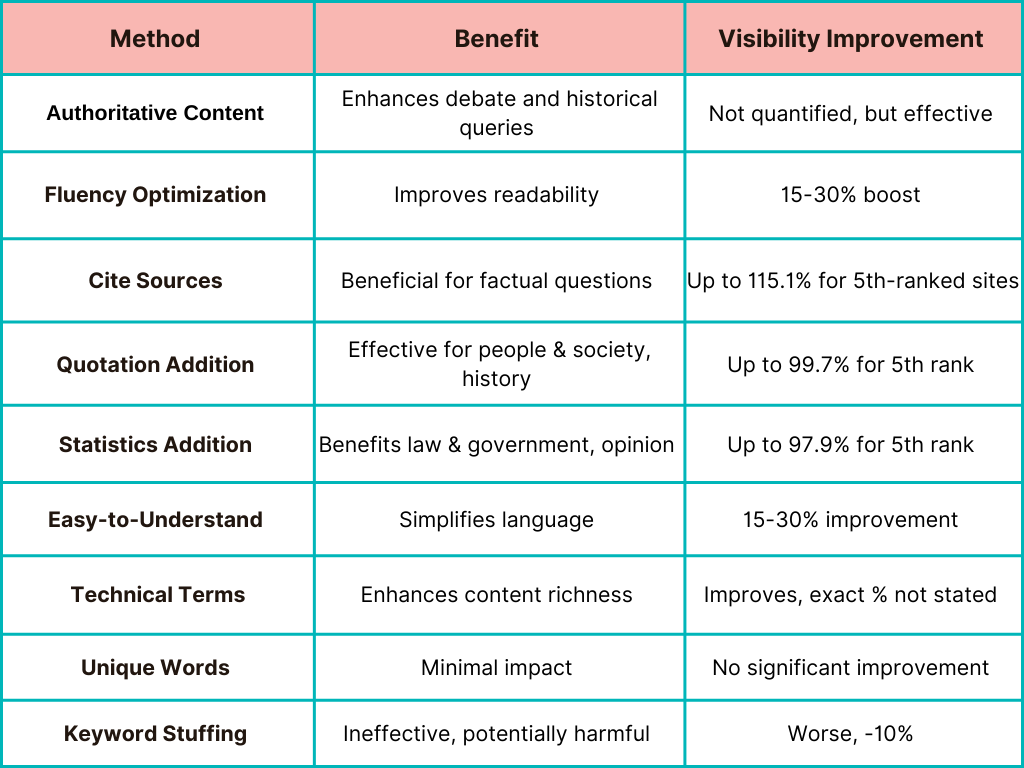
Additional Tactics to Implement for GEO
Focus on High-Quality, AI-Friendly Content
Prioritize creating content that is accurate, insightful, and structured for generative AI SEO systems to process effortlessly.
This aligns with the Experience, Expertise, Authoritativeness, and Trustworthiness (E-E-A-T) framework by showcasing your knowledge and delivering reliable information that generative engines can confidently use to serve users.
Leverage Semantic SEO & Entity-Based Optimization
Shift your attention beyond mere keywords to the deeper meaning and connections within your content. This approach clarifies context and purpose for AI engines.
Use resources that pinpoint key entities—specific names, places, or ideas—and weave them naturally into your work to heighten its semantic weight.
Create AI-Optimized FAQs & Conversational Content
AI thrives on straightforward, dialogue-like text that mirrors how people speak. Well-crafted FAQs and conversational posts connect with users while being simple for AI to grasp.
Add structured data, such as Schema Markup, to these sections to boost clarity and recognition by advanced systems.
Implement Multimodal Content (Text, Images, Videos)
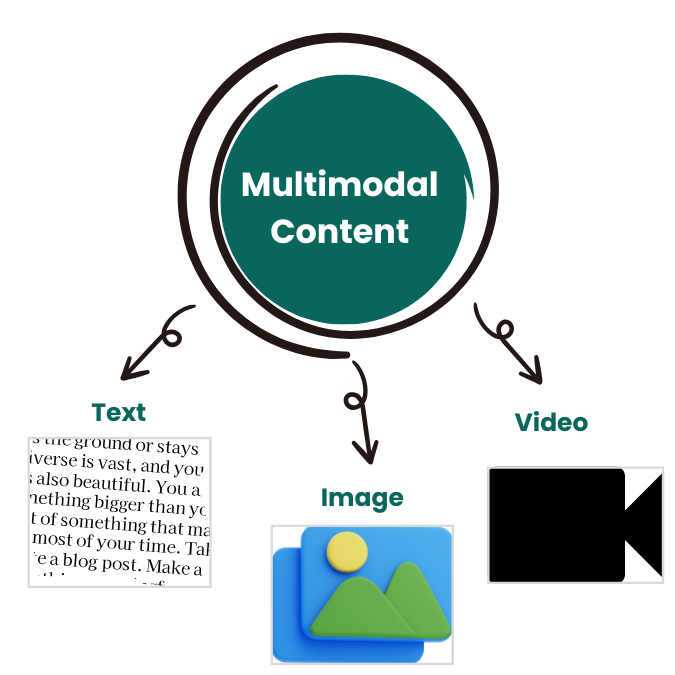
Modern AI evaluates content across multiple formats, from written words to visuals and clips.
Blend these elements smoothly, enhancing them with detailed alt text, metadata, and captions. This ensures AI can fully interpret your message, increasing its chances of prominence.
Strengthen Internal Linking & Contextual Relevance
AI values a tight web of links that tie your content together, signaling expertise and depth. Make sure each link is purposeful, directing users to related, quality pieces.
The stronger the contextual ties, the more AI will trust and promote your work.
Optimize for Mobile and Voice Queries
As voice searches and mobile use grow, tailor your content for these habits.
Use natural phrasing and brief, clear responses for voice, while ensuring your site loads quickly and adapts seamlessly to mobile screens.
Track & Adapt to AI Algorithm Changes
AI systems shift frequently, requiring vigilance. Keep abreast of updates in generative engines, modifying your approach as needed.
Rely on analytics to monitor how your content performs and spot changes in AI preferences, staying ahead of the competitors.
The Challenges: Navigating Uncharted Waters
Understanding AI Preferences
Grasping how AI systems prioritize content remains a hurdle. Their preferences evolve rapidly, often lacking clear guidelines, making it tough to predict what will resonate with generative engines.
Solution: Stay updated on AI advancements, analyze AI-generated search results, and focus on structured, high-quality content.
Measurement Gaps
Tracking GEO success is elusive. Traditional metrics like clicks and rankings don’t fully capture performance in AI-driven responses, leaving businesses without solid benchmarks to gauge effectiveness.
Solution: Use engagement-based metrics (dwell time, interaction rates) and AI-specific analytics tools to assess visibility.
Risk of Misrepresentation
Content optimized for AI may be misinterpreted or oversimplified. This can distort your message, potentially undermining trust if generative outputs fail to reflect your intent accurately.
Solution: Ensure content clarity, provide structured data, and fact-check AI responses to maintain accuracy.
Balancing Act
Merging GEO with established SEO practices presents complexity. Aligning strategies to serve both traditional search engines and AI systems demands careful planning and resource allocation, often stretching capabilities thin.
Solution: Adopt a hybrid approach—use conversational content for AI while maintaining keyword optimization for traditional search.
The Future of SEO – GEO
AI Evolution – Agentic AI
With artificial intelligence progressing, the emergence of Agentic AI—capable of independently tackling tasks—will transform GEO.
Companies will need to create content that aligns with these systems’ ability to make decisions, requiring flexible and intentional strategies to stay effective.
Personalization Surge
A wave of customization is on the horizon, as AI begins crafting responses unique to each user.
To keep pace, GEO must prioritize content that caters to individual tastes, backgrounds, and needs, ensuring it connects meaningfully in a highly tailored digital space.
Emerging Tools
Fresh tools and solutions will arise to support GEO efforts. These innovations will provide sharper ways to study AI patterns, enhance content, and measure outcomes.
Ethical Horizon
The expansion of GEO will bring ethical questions into focus. Businesses will need to ensure transparency, fairness, and accuracy in AI-optimized content.
Tackling issues like bias and inaccuracies to preserve credibility and meet their obligations is important in an evolving environment.
Conclusion
As AI-driven SEO reshapes digital search, businesses must evolve their approach to stay visible. GEO is not a replacement to traditional strategies but a necessary adaptation to the changing search market. By focusing on AI-friendly content, semantic optimization, and structured data, brands can enhance their presence in generative search results.
Success in this new era requires continuous learning, adaptability, and a balanced strategy that integrates both traditional and AI-driven optimization.
Future-proof your content and lead the AI-driven search revolution—start optimizing today with professional guidance from our experts!


